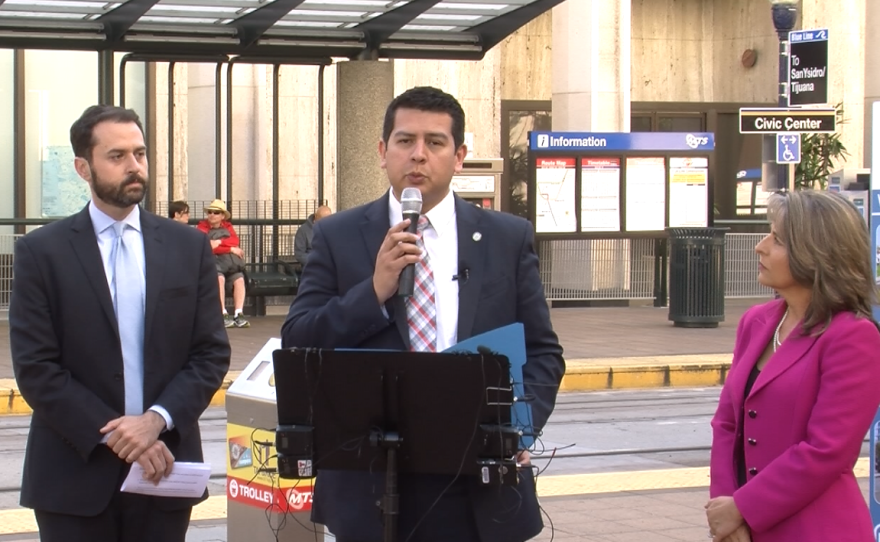San Diego’s Metropolitan Transit System is working toward adding the long-delayed function of stored value to its electronic fare card, the Compass Card, by Nov. 1.
The county’s largest transit operator compiled a timeline listing a number of steps to be taken along the way, including training bus drivers on the new function, testing it in lab simulations, marketing its rollout and developing a revenue-sharing agreement with the North County Transit District, which also uses the Compass Card.
Stored value allows riders to load and store virtual cash on a fare card and use that money for single rides, day passes or other fares. The function tends to benefit "choice riders" — people who likely have a car but use public transit sporadically. It exists in nearly every other big-city transit system in the country.
MTS spokesman Rob Schupp cautioned that the timeline was tentative and could be delayed if there are problems during testing. But he said the added function would provide greater flexibility for different types of transit riders, and that it could ultimately increase ridership.
"It's been stated that people out there would ride more often if they had that greater flexibility," Schupp said. "Getting choice riders out of their cars and into transit is another of our goals."
RELATED: San Diego’s MTS Compass Card Stuck In The Past
Stored value was part of the original plan for the Compass Card, which first came into use in 2009. MTS CEO Paul Jablonski predicted in a KPBS interview in 2013 that it would be in place by fall of that year.
Public records obtained by KPBS show MTS had a timeline in November 2013 for implementing stored value by the following March. But the timeline was interrupted by technical glitches that occurred during the test phase, described in a series of emails. By the following summer, MTS staffers appeared to question whether stored value was worth the trouble. On July 9, 2014, MTS Controller Erin Dunn wrote: "we might need to reconsider if/when we launch stored value."
Shifting priorities
As stored value dropped on MTS's list of priorities, the agency began focusing on developing a new mobile ticketing app. The app would offer similar flexibility with paying fares and the added convenience of keeping all the transactions on a rider’s smartphone.

Pressure from some MTS board members and the transit advocacy group Circulate San Diego put the issue of stored value back on the radar. Colin Parent, policy counsel for Circulate San Diego, said he was encouraged by the renewed commitment.
"Having stored value is just going to expand the types of ways that people are able to pay to ride transit," he said. "This is just a great example of how a public agency like MTS can make a meaningful improvement for the lives of transit riders."
The MTS board, made up of elected officials from southern and eastern San Diego County, approved in April a contract with tech company moovel North America to develop the mobile ticketing app. The board is being asked to give a second approval to that contract at its meeting on June 9, after the runner-up company, Bytemark, challenged the cost analysis in the bid process. The delay has pushed back the app’s expected roll-out from August to mid-September.
KPBS reporting this year revealed the Compass Card system also has data security flaws and is falling short of the mandatory standards developed by credit card companies to reduce fraud. The problem has existed since the cards were first put in use under the supervision of the San Diego Association of Governments, the region's transit planning agency.
Schupp said the Compass Card system still did not meet the data security standards, but that MTS continues to "make upgrades to the system" to get it closer to compliance.






